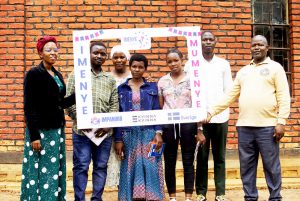Buried with the phone: Rwandans question where the dead’s mobile money goes
3 min read
On a quiet afternoon in Nyamirambo, a vibrant and densely populated neighborhood in Kigali Town, Jeanette sat with her siblings, staring at her late brother’s phone. He had died suddenly, leaving behind little property, but on his mobile money account, more than RWF 600,000 sat untouched.
“At first, we thought it would be simple,” she recalls. “You go to MTN, show the death certificate, and they give you the money. Instead, they sent us to the courts. Months later, we had spent money on papers and transport, but got nothing. We buried our brother, and with him, his money.”
Her story is echoed across Rwanda. Families know that in those tiny SIM cards lie funds that could help cover funeral costs, school fees, or hospital debts. Yet for many, that money seems locked away forever.
Service providers bound by rules
Mobile money companies, however, say their hands are tied. An MTN Rwanda customer care officer explained to Isoko News:
“We cannot release money simply because someone claims to be family. To avoid fraud, we need clear documents: death certificates, family council resolutions, or even a court order. Otherwise, we could be sued for giving money to the wrong person.”
That position may protect companies legally, but it often leaves families feeling abandoned in moments of grief.
Law before emotion
The National Bank of Rwanda (BNR) insists the process is about order, not cruelty. A BNR official clarified: “The law requires that after five years of inactivity, unclaimed balances are transferred to the central bank. Families can still claim them, but through formal documents. This protects rightful heirs and prevents misuse.”
Yet, for many ordinary Rwandans, those words feel like a distant echo. The idea of chasing courts, lawyers, and government offices is intimidating, especially in rural areas.
Legal experts argue that the current framework is too heavy for average citizens. Juliette Kavaruganda, a Kigali-based lawyer, put it bluntly: “Imagine a widow in a village who loses her husband. She does not even know where to start. She cannot afford a lawyer. By the time she figures it out, the money is gone. That is injustice hidden in paperwork.”
The cry of the forgotten
In Nyagatare, an elderly farmer laughed bitterly when asked about his late father’s mobile wallet: “We buried him with dignity. But we know his phone still had money inside. Today, it is as if that money was buried with him. A cow is easier to inherit than mobile money. Yet now, people die with more money in their phones than in their homes.”
Across Rwanda, voices are growing louder for reform. “It should not take a court process for a family to access what is rightfully theirs,” argues Jean Bosco Mukunzi, a citizen in Muhanga, a satellite town to Kigali. “Just as banks allow nomination of next of kin, telecoms should let subscribers name a beneficiary when they open a mobile money wallet.”
People in rural areas think that awareness and accessibility are crucial. Aline Uwimana, living in Nyagatare, says: “Families in villages cannot afford lawyers. If local authorities were empowered to verify and process these claims, it would save time and protect citizens from losing hope.”
Financial law experts also call for harmonization with neighboring countries. In Uganda, telecom operators such as MTN Uganda require families of deceased customers to present legal documents, including a death certificate and letters of administration, before claiming mobile money funds. According to an article by the Daily Monitor (February 2024), the process can take weeks or even months, but it ensures that only legitimate heirs receive access to the funds.
In Kenya, Safaricom’s official policy on M-Pesa inheritance allows a registered next of kin to claim the balance of a deceased account holder after presenting a death certificate and proof of identity. If the funds remain unclaimed, they are eventually transferred to the Unclaimed Financial Assets Authority (UFAA), as reported by Nation Media Group (2023).
Experts argue that similar procedures could help Rwanda balance legal protection with compassion for grieving families, while preventing unclaimed digital money from disappearing into regulatory limbo.
Telesphore KABERUKA


